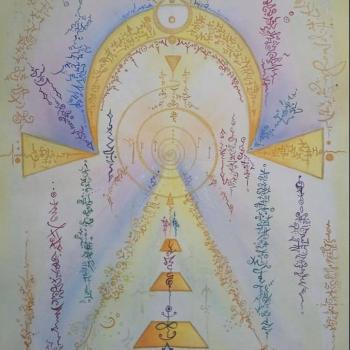Sermon for 9/11/2010
Texts: Luke 24:13-35; Revelation 21:1-7
Nine years ago, on September 11th, 2001, I was working at a small NGO called the Nicaragua Network just off Pennsylvania Avenue, SE, about 8 blocks from the Capitol. When I arrived at work that morning around 9 am, everyone was gathered quietly around the television. I remember watching the towers fall on TV and hearing about the Pentagon. Then I bolted out to Pennsylvania Avenue because I needed to make sure they hadn’t hit the Capitol.
I can’t remember exactly where I went after that. Work was canceled for the day. I remember seeing big military vehicles rumbling through the streets of DC as I wandered northwest. I saw people looking as dazed and scared as I was and presumed they all had the same thing weighing on them that I did. Eventually I found my way to Luther Place Memorial Church on 14th Street to gather with a group of strangers in a small chapel to pray and comfort one another. It was one of the strongest experiences of Christian community I have ever been a part of. The strange togetherness that came out of that tragedy lasted for the next few weeks. People on the subways actually talked to one another. If a stranger cried, others would comfort that person. It was beautiful, and I wish it could have lasted.
As I struggled with what to preach on September 11th, I remembered this dazed and troubled journey I took around DC that day and wondered whether Cleopas might have been in a similar frame of mind as he and his friend made a dazed and troubled journey to Emmaus the week after Jesus was crucified. Cleopas’ words reveal his utter despair: “We had hoped that he was the one to redeem Israel” but “our chief priests and leaders handed him over to be condemned and crucified.”
Let me give you a little background on Cleopas’ hope. The people of Israel had been ruled for 500 years by half a dozen different empires. Under the Persians, they had been allowed to return to their land and rebuild their temple but things got pretty nasty under the Macedonians. One particular ruler named Antiochus IV looted the Jewish temple and put up pagan statues inside it. So the Jews revolted, led by a guy named Mattathias Maccabee and his sons (whose rebellion is the basis for the holiday Hanukah). For a while they held onto their independence, but then Rome conquered everybody, and Palestine was put under the puppet kingship of Herod the Great, who was technically Jewish but more interested in schmoozing with Roman bureaucrats and absolutely brutal towards his own people.
In Jesus’ day, the Jews technically had their own temple but they lived every day under the boot of Rome. They remembered the courage of the Maccabees and they had all heard the legend of the messiach (or anointed one) who would rise up from the line of David to put God’s king back on the throne of Jerusalem. Many false messiahs had risen up to revolt against Rome. All of them failed. But this Jesus was supposed to be different. He did miracles. He preached from the Jewish scriptures with authority unlike anyone had ever heard from the scribes or teachers of the law. He proclaimed the coming of a new kingdom in which God’s people would be set free. And then the chief priests and leaders felt threatened; they worried about what Rome would think. So they had Jesus crucified, another failed messiah. So everybody thought.
What Cleopas and his friend didn’t know was that their mysterious traveling companion was their crucified messiah resurrected from the dead. They also didn’t understand that Jesus’ mission went a lot deeper than simply being the anointed political leader of the Jews. Messiah, or Christos (the Greek translation), is only one half of Jesus’ name. The first half is Yeshua, or Iesous, which means “savior.” Saving the world required something different than merely leading a Jewish army into battle against Rome. To truly conquer Rome and the Roman way of doing things required a far deeper and subtler form of being a Messiah.
The Bible says that Jesus taught Cleopas and his friend while they walked down the road together by going through Israel’s history to explain why the Messiah had to suffer as he did. We don’t know what he said. We do know that God could have chosen many bigger, more powerful cultures to be his chosen people. He could have picked the Egyptians, the Hittites, the Assyrians, the Babylonians, or the Persians. But instead he chose a tiny band of freed slaves living on a sliver of land in between all the great ancient empires. And while all those other empires came and went and all the other ancient Middle Eastern cultures got absorbed into the melting pots of their conquerors, God miraculously kept this group of freed slaves called Israel together through famine, war, exile, and conquest.
We also know that Jesus could have been born a prince or even into the family of a high priest but instead he chose to be born in a smelly barnyard into a poor carpenter’s family. This meant that Jesus could relate to any human being no matter how low on the totem pole they were. And when Jesus told the truth too many times and offended too many powerful people, he could have called up a band of angels to whisk him back to heaven, but instead he humbled himself, taking the nature of a slave and submitting to death on a cross so that no human being’s experience could be beneath what Jesus had experienced.
We don’t know what Jesus said to Cleopas and his friend, but we know that all the time Jesus was teaching, they didn’t recognize him. And I suspect that many times in the past nine years, Jesus has taught us without our recognizing him. As we grieved the loss of life and loss of feeling safe after 9/11, Jesus kept walking and teaching. As we’ve watched our country get more divisive and mistrustful of one another, Jesus has kept walking and teaching. As we’ve allowed ourselves to get mad enough to feel and say un-Christian things, Jesus has kept walking and teaching.
And here’s the irony: the very thing that was the source of Cleopas’ despair, Jesus’ death on the cross, is the greatest proof that Jesus really does walk with us. He has walked in our shoes and put himself through the most brutal possible human suffering, so that he can relate to each and every one of us. Nothing we have suffered is greater than what Jesus has suffered for our sake. No evil we have committed is greater than the evil that was committed against Jesus. We don’t have to get to the bottom of who’s to blame for the whole messy baggage of things we’ve done wrong and ways we’ve been wronged by others because Jesus has said, “Blame me! Take all that baggage to the foot of my cross and leave it there!”
When we recognize our savior messiah by giving our sins and our grievances to him, then our dazed and troubled journey changes direction. All this time, Jesus has been patiently following us through our struggles, quietly teaching us, so that when we figure out who He is, we will follow Him to a place of joy. When Jesus broke the bread and gave thanks in Emmaus, the eyes of Cleopas and his friend were finally opened. So what did they do? They ran as fast as they could back to Jerusalem to rejoice with the other disciples.
On one level, nothing about their life had changed. Roman soldiers were still dominating the streets. Corrupt politicians and religious leaders were still in charge. Only one thing changed: they knew that Jesus was alive! And when you know that Jesus is alive, it’s hard to keep from dancing in the streets. It probably won’t make any sense to the people around you. It isn’t supposed to make sense for people who have been through tragedy to dance with joy, but if we allow ourselves to do what doesn’t make sense, if we give our burdens to Jesus, then we can take up our own crosses and dance with the one who conquered the cross.
This is where our brothers and sisters in Africa provide us with an excellent witness. Africa has been through so much even in the last decade: genocide, war, and other countries stealing natural resources. But nowhere else in the world is the body of Christ growing like wildfire and rejoicing in the midst of suffering like in Africa. We are singing songs today that have been sung by thousands of people who rejoice because they give their troubles to a Jesus who is still alive and put their hope and trust in Him.
When we see our world through the eyes of faith, we can see the New Jerusalem that Revelation is talking about. This is not only a prophecy for the end of time but for the reality of God’s kingdom that we can experience right here and right now if we surrender all the barriers that keep us from rejoicing with our risen, living savior king. As we start out a new season in our life together, let us take to heart the words of the One on the throne: “See, I am making all things new.” Whatever has happened to us, whatever discouragement we feel from how the world around us has become, God has the power to make our lives new every day. Jesus is alive! And He’s been walking with us all along. Are we ready to walk with Him?











